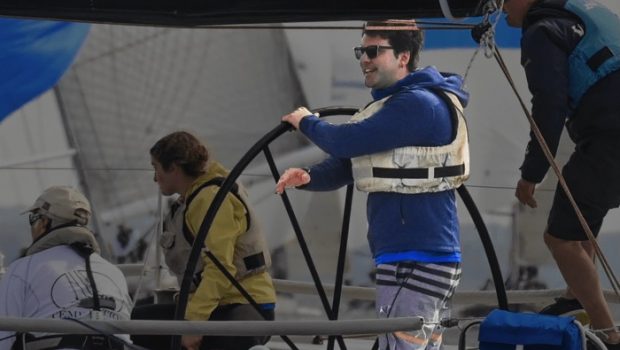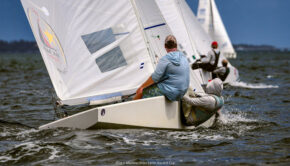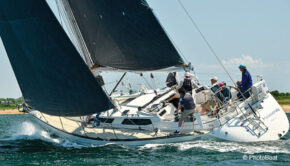Pride and outreach in sailing
Published on June 6th, 2022
Patrick Burks is a sailor, race official, umpire, and coach, and a member of the LBGTQIA+ community. Burks first came out as gay in high school “because that was the best I could describe myself at the time,” said Burks. “Since then I’ve found out just how intricate sexuality and gender is, and have new language to talk about it.”
Burks now also describes himself as non-Binary using either He/Him or They/Them pronouns. “I try to focus on just being myself. And if people take issue with that, then it’s their problem.” As he entered the sailing world, Burks didn’t often encounter overt discrimination; but once had an acquaintance that told him he would be better off if he never came out to the greater sailing world.
“It was a sign that the sailing world wasn’t a super open or welcoming place,” he said. “But that’s why pride and the outreach I do is so important. I need to be visible so that other LBGTQIA+ people in the sailing community have an example; someone to look up to.”
Burks grew up around the water, sailing and powerboating on the lakes and rivers around St. Louis, Missouri with their family. Burks were introduced to racing through a small club in the St. Louis area while attending Webster University’s Conservatory of Theatre Arts.
“I showed up one day to watch and take some pictures, and I was walking around the boat park and someone said asked if I knew how to sail,” he said. “From there I dove in headfirst.”
Burks took the newfound interest to New York, where he moved when he got his first job in the theater industry. He began sailing with Manhattan Yacht Club after work, where he also found interest in the race management side of sailing, eventually turning that interest into a career.
Burks is now a coach for the US Sailing Siebel Sailors Program, teaching sailing to the next generation of more diverse sailors, as well as doing their own sailing and umpiring work.
It was 2020, during the COVID pandemic, that Burks first got seriously thinking about LBGTQIA+ activism in sailing while watching a US Sailing Starboard Portal focused on Diversity, Equity and Inclusion in the sport. It was after that when he encountered a Scuttlebutt Sailing article about Rainbow Races that Burks reached out to founder Charles Szymanski.
“I reached out to say, ‘How can I help?’” said Burks. “I believe sailing is at a point where we have to change the stereotype of the sport being exclusive, because we can’t afford to turn anyone away. The LBGTQIA+ community especially is a portion that has not always been embraced in many of those circles but are a demographic that often can come up with some of the resources needed to get into a sport like sailing.”
Rainbow Races began in 2019 as a Pride Regatta in the Chicago area. In an effort to bring his love of sailing to the LBGTQIA+ community, founder Chris Szymanski created the nonprofit to host LBGTQIA+ specific sailing events and educational courses.
Besides hosting a number of Pride sailing events, Rainbow Races has embarked on the challenge of creating the first-ever LBGTQIA+ sailing school. With a donated 30-foot keelboat, the organization plans to host learn-to-sail and US Sailing Basic Keelboat courses with certifications for members of the community and allies.
“Looking towards the future, as long as we have success with this, we hope to grow to have multiple boats in different harbors in Chicago and expand programming to include racing and coastal cruising,” said Burks.
Besides access to safe spaces like that provided by Rainbow Races, to Burks, one of the biggest challenges facing the LBGTQIA+ community in sailing is a lack of awareness and education. Taking the time to educate oneself on things like gender identity and pronouns can make a big difference.
“The system we live in was built for cisgender heterosexual white men. Not being all those things means you have farther to go to get to their start line. I strive to use my privilege being born white and assigned male at birth to help those who aren’t get to the start line and beyond. I challenge everyone reading this to keep that in mind in your sailing community and in your life to do something to help, even the smallest of ways,” said Burks. “If someone corrects you on a pronoun, make the effort to learn and try not make the same mistake again.”
All-in-all, Burks said, “Just treat us like people, we’re just sailors, we’re just people who want to get out and enjoy time on the water like everybody else.”
Source: Lexi Pline, US Sailing









 We’ll keep your information safe.
We’ll keep your information safe.